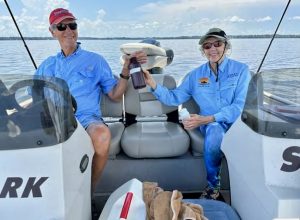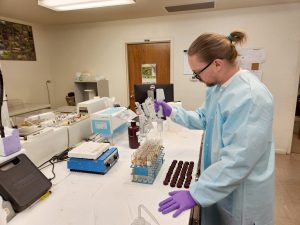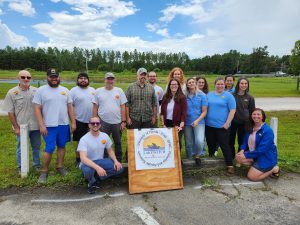By Dr. Liz Moreau
Tom and Peggy Prevost adore Lake Santa Fe and its smaller basins, Melrose Bay and Little Santa Fe Lake.
“When I look out, you never know what you’re going to see in the mornings,” says Tom. “It’s a blessing. The natural beauty that we’re able to see…so you have an interest in keeping the lake and water quality good.”
That interest in water quality led Tom and Peggy to become volunteers for Florida LAKEWATCH 34 years ago.
LAKEWATCH is a citizen volunteer lake monitoring program that facilitates “hands-on” citizen participation in the management of Florida lakes, estuaries, rivers and springs through monthly monitoring activities.

Coordinated through the University of Florida’s Institute of Food and Agricultural Sciences (IFAS) and UF’s School of Forest, Fisheries, and Geomatics Sciences (FFGS) Fisheries and Aquatic Sciences, the program has been in existence since 1986.
Volunteers throughout Florida
In 1991, the Florida Legislature recognized the importance of the program and established Florida LAKEWATCH in the state statutes (Florida Statute 1004.49.). LAKEWATCH is now one of the largest water monitoring programs in the nation with over 1,800 trained citizens currently monitoring 525 lakes, 175 estuary stations, 125 river stations, 20 coastal dune lakes, and 10 spring runs in 57 counties.
The Florida LAKEWATCH program all starts with volunteers. After being trained by one of the program’s coordinators, people like Tom and Peggy take monthly water samples and other readings at three stations on their lake.
Those samples are frozen and dropped off at one of the program’s collection centers around the state. LAKEWATCH coordinators retrieve these samples and bring them to their analytical labs at UF’s Millhopper campus in Gainesville. A team of seven lab staff then analyze the samples for nutrients (total nitrogen and phosphorus), algae proxies (chlorophyll a), color, and conductivity, all of which can help lake managers and scientists better understand our waterbodies.
After going through rigorous quality control and assurance checks, the data are sent to the LAKEWATCH data manager, who incorporates them into the program’s databases and uploads them to Department of Environmental Protection’s Watershed Information Network.
Sharing results
All the data are also given back to the volunteers, usually at one of the many annual meetings that Florida LAKEWATCH holds around the state. These meetings are one of the way the program gives back to its volunteers, offering information, food, and the sharing of ideas around waterbody management and conservation.

In the more than three decades of volunteering, the Prevosts have only missed a handful of samples, racking up 433 months of sampling from their beloved 24-foot Sea Auk, “The Big Easy.”
The boat’s name harkens back to Tom’s childhood in New Orleans, but he spent his summers in Melrose with his grandparents, who built the house that Tom and Peggy now live in on Melrose Bay.
Tom fell in love with his lake at a young age and moved to the area upon graduating from high school. He soon met Peggy and they grew their family, raising three daughters who love the lake as well. They spend as much time as possible on the lake fishing, bird watching, and water skiing.
Tom claims that their impressive sampling record is simply because their schedules and abilities allow it, though it’s clear there is also deep passion for conserving the beauty and function of this precious natural resource. In addition to the regular monthly LAKEWATCH sampling, Tom and Peggy have participated in various research projects over the years.
One such project involved sampling of 36 stations to assess whether nearby farmland was adding fecal coliforms to the lake water.
Recently, the Prevost’s local lake association honored their work by presenting them with a plaque.
“Dedicated volunteers, like Tom and Peggy, are the heart of the Florida LAKEWATCH program,” said Florida LAKEWATCH Director and FFGS Assistant Professor Gretchen Lescord. Their collective time and energy have translated to over 2 million data points across approximately 22 percent of Florida’s lakes since 1986. But they don’t stop there – volunteers like Tom and Peggy know their lakes better than anyone and their insights help us understand our data and the broader ecosystem ecology and chemistry.”
Interested in volunteering for Florida LAKEWATCH? Click here for more information or call 1-800-LAKEWATCH or email: fl-lakewatchufl.edu
ABOUT UF/IFAS
The mission of the University of Florida Institute of Food and Agricultural Sciences (UF/IFAS) is to develop knowledge relevant to agricultural, human and natural resources and to make that knowledge available to sustain and enhance the quality of human life. With more than a dozen research facilities, 67 county Extension offices, and award-winning students and faculty in the UF College of Agricultural and Life Sciences, UF/IFAS brings science-based solutions to the state’s agricultural and natural resources industries, and all Florida residents. ifas.ufl.edu | @UF_IFAS

 2
2
